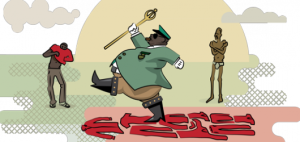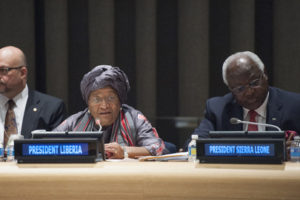Every year, thousands of children and adults are dying needlessly of preventable illness, disease and poverty in Sierra Leone, because of corruption.
And the performance of the Koroma government in tackling corruption since 2012, compared to the efforts of Helen Sirleaf’s neighbouring Liberia is shocking, according to figures published by Transparency International.
The twenty-first annual edition of the Transparency International Corruption Perception Index 2015, has ranked Sierra Leone 119 out of 168 countries worldwide, but with a much lower score of 29 over 100, compared to 2014 (31 over 100), 2013 (30 over 100), and 2012 (31 over 100).
In just four years, corruption in Sierra Leone has gone up by two percentage points, says Transparency International.
Sierra Leone’s performance is four percentage points worse than the Sub-Saharan Africa’s average of 33 over 100, with Botswana once again topping the region – scoring 63 over 100.
The Berlin-based Transparency International rank states according to their levels of public sector corruption, as judged by around a dozen world institutions such as the World Bank, the International Monetary Fund, Economist Intelligence Unit and the Asian Bank.
According to the report published last week: “Sub-Saharan Africa faced a myriad of threats in 2015, from the Ebola epidemic to rising terrorism. Again and again we saw corruption exacerbate the causes of crises, and undermine the response.”
In Sierra Leone we saw $14 million of funds meant to help treat and ease the suffering of thousands dying of Ebola, stolen by corrupt public officials and their private sector cronies.
The corruption index report says that: “This year’s index presents a worrying picture – with 40 of 46 countries (in Sub-Saharan Africa) showing a serious corruption problem….Indicators for rule of law and justice score particularly badly.
And, “While some governments are reducing risks for business, there’s little change for citizens – as systemic corruption leaves many countries struggling to uphold basic rule of law.”
According to Transparency International: “Poorly equipped schools, counterfeit medicine and elections decided by money are just some of the consequences of public sector corruption. Bribes and backroom deals don’t just steal resources from the most vulnerable – they undermine justice and economic development, and destroy public trust in government and leaders.”
“A poor score is likely a sign of widespread bribery, lack of punishment for corruption and public institutions that don’t respond to citizens’ needs.”
The authors of the report say that top performers have high levels of press freedom, public access to budget information, high levels of integrity among people in power and an independent judiciary.

So how did Sierra Leone perform, compared to her neighbours – Liberia and Guinea, the two countries Sierra Leone would need to compete with for foreign investments?
Since president Koroma got elected in Sierra Leone for the second time in 2012, his performance in tackling rampant corruption, compared to Helen Sirleaf of Liberia, has worsened.

In 2013, Sierra Leone’s score fell to 30 over 100, compared to Liberia’s 38 over 100, and Guinea’s 24 over 100.
In 2014, there was not much of a change as the pattern continued, with president Koroma of Sierra Leone trailing behind Helen Sirleaf of Liberia in combating corruption. Liberia scored 37 percentage points, Sierra Leone 31 percent, and Guinea as ever trailing behind her two neighbours with 25 percent.
And in 2015, Liberia was ranked 83 out of 168 countries – same ranking as Sri Lanka, and scoring 37 over 100. Sierra Leone was ranked 119 out of 168 – trailing Liberia by a massive 36 points margin, and with an appalling score of 29 over 100.
Liberia’s 37 over 100 was better than the Sub-Saharan Africa’s average of 33.
So what is president Helen Sirleaf of Liberia doing right that president Koroma of Sierra Leone is getting so woefully wrong or failing to grasp?
Is corruption far more endemic in Sierra Leone than Liberia (according to the figures) because Helen Sirleaf herself is less tolerant of corruption in high places?
Is strong and principled leadership a factor in the fight against corruption in Sierra Leone?
Supporters of president Koroma point out to the more than $500 million spent by president Koroma on infrastructure – road networks in the country, since elected in 2007. But there are serious allegations that of this $500 million, over 60% cannot be accounted for. This lack of accountability was a major problem for the African Development Bank in 2011.
What needs to happen?
“Corruption can be beaten if we work together. To stamp out the abuse of power, bribery and shed light on secret deals, citizens must together tell their governments they have had enough,” José Ugaz, chairman of Transparency International, said in a statement. (Photo: President Koroma’s former chief of staff and minister of trade – Richard Conteh, escaped justice with impunity, despite being embroiled in a $47 million corruption racket).
The authors of the report say that: “If corruption and impunity are to ‘be a thing of the past’ as boldly stated by the African Union in Agenda 2063 – ‘The Africa We Want’, governments need to take bold steps to ensure rule of law is the reality for everyone.
“Prosecuting corruption will restore faith among people who no longer believe in the institutions that are supposed to protect them. Transparency and accountability must go hand in hand when tackling corruption – as these results show, this is still far from the norm in Africa.”
The Sierra Leone Telegraph yesterday contacted the newly appointed Attorney General and minister of justice – Joseph Kamara (Photo), who until the end of December 2015 was Sierra Leone’s head of the Anti-Corruption Commission to comment on this latest report by Transparency International. He made no comment.
Sierra Leone continues to be ranked as one of the poorest nations in the world, despite a 13% growth in GDP in 2013, compared to the African average of 4.5%.
With a population of 6 million people, only 41% of adults are literate, while more than 50% of adults die before they celebrate their 47th birthday.
Over 70% of young people are unemployed and unskilled. Only 12% of households have access to electricity, while more than 60% of households do not have access to regular supply of clean drinking water.
Most Sierra Leoneans are struggling to make ends meet, with average personal income of slightly more than $1 a day.
Corruption is responsible for the abject poverty and poor health that are killing the vast majority of children and adults in Sierra Leone. And it seems from the latest Transparency International report, there is no hope of an improvement.
Yet, Sierra Leone is endowed with some of the finest and most precious diamonds, gold and other natural resources in the world.
By Abdul Rashid Thomas
No comments:
Post a Comment